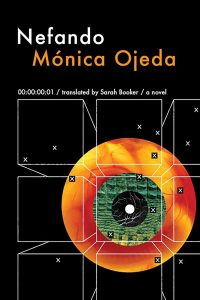Niall Harrison Reviews Nefando by Mónica Ojeda
 Nefando, Mónica Ojeda (Coffee House Press 978-1-56689-689-4, $17.95, 184pp, tp) October 2023. Cover by Kyle Hunter.
Nefando, Mónica Ojeda (Coffee House Press 978-1-56689-689-4, $17.95, 184pp, tp) October 2023. Cover by Kyle Hunter.
Describing the scenario that confronts the reader in Nefando is easy enough. Six people who were sharing an apartment in Barcelona have had their lives upended by the titular, highly disturbing video game. “El Cuco” Martinez helped to design the game for “the siblings,” Irene, Emilio, and Cecilia. Iván Herrera and Kiki Ortega, both writers, played it. It was made available online. The police got involved. The siblings fled the country and disappeared. The others remained, were investigated, and are now being interviewed by a journalist trying to piece together what happened.
Trying to convey the full impact of this scenario is harder. Nefando is a challenging book in several senses, some rewarding, some off-putting, none accidental or incidental. First, it is a novel in which form defines character. The journalist’s interviews are straightforward enough, but they are interspersed with more complex chapters about Kiki, Iván, and El Cuco, as well as a few other documents. Kiki’s narrative takes place on two levels at once: part of her mind is continuously weighing up ideas for the pornographic novel she is writing, which appear in italics, sometimes as total non sequiturs (“In Mexico, writing had felt like walking on needles. Diego and Eduardo would fall in love as intensely as they desired the opposite sex. It’s impossible to write at home”). Iván’s narrative is a dense second-person record of gender dysphoria (“You’d feel phantom breasts bouncing across your ribs, and the sensation sent a flutter of pleasure across your chest… you were missing organs, and no-one knew”) and self-harm (“the tip of the pencil was a lance against your flaccid flesh”). Paragraphs run on, claustrophobically, for pages. El Cuco’s narrative is the most conventional of the three, but is still occasionally studded with blocks of computer code and code-like text. None of them say much directly about what happened; all of them are eloquent, in different ways, about how it felt.
The second layer of challenge is intellectual, the challenge of holding in your mind not just events, but the argument Ojeda is building from them. The novel starts with Kiki’s certainty that “it had to be possible to create a language that didn’t devour itself,” and ends with El Cuco asking his interviewer, desperately, “Do you think there are words for this darkness?” In between is an investigation of the relationships between mind and body and words, lensed specifically through the relationship between pleasure and suffering. For Kiki, “our bodies are never more ours than when we’re in pain”; her pornographic novel (I think) sets out to demonstrate this thesis, and meanwhile, Iván, in constant psychological pain caused by a body she knows is not truly hers, provides a refutation. (I don’t think pronouns are ever applied to Iván within the novel by someone who knows how she feels, but her sense of gender identity seems consistent and seems to align with her desired body, so she/her feels most appropriate to me.) Her mind is a terrible consequence of her imperfect body, directing her pain outwards: “You knew then that you could hurt others for the sake of anthropological curiosity and nothing more.” For El Cuco – the nerd, of course, he thinks about Asimov and Dick and Moebius – it’s an open question whether technology, and virtuality specifically, can facilitate the “final eradication of our animal side,” a prospect he diagnoses as “simultaneously utopian and dystopian.” I think Ojeda, in the end, comes down on the dystopian side: I think Nefando joins those who argue that our worst excesses are an ineradicable part of what makes us human. But it’s a close-run thing.
That leads to the third challenge, which is, simply, the relentlessly visceral content. Sarah Booker’s translation is an astonishing text; Nefando is the second of Ojeda’s novels that she has rendered into English, and if Jawbone (2018/2022) is in any way similar, which reviews suggest it may be, they must both have been exhausting work. Nefando is exhausting to read. In the terms of John Clute’s grammar of horror, it seems to me a book composed almost entirely of revel, the moment when a horror novel aspires to put the underbelly of the world front-and-centre under the guise of reality. I’ve mentioned Iván’s dysphoria and self-harm; I’ve mentioned Kiki’s pornographic novel, which is excerpted for us, and is filled with abuse and degradation. Nefando, in under 200 pages, also contains child abuse, torture and murder of pets, adult rape, and more. The game itself begins in a room where the only things the user can do are to wait, or to hit the naked body of an unresponsive woman. At the centre of it all, you will deduce, are the siblings, who are only ever described by others, except for a late illustrated chapter showcasing some unsettling artworks by Cecelia, subtitled, “exhibition of my ruins.” El Cuco describes the siblings as “the opposite of science fiction” because “they looked backward to see the present”: it seems that the game is part of an attempt to awaken the same gaze in others. If you read this novel, it may be awakened in you, as well.
In Niall Harrison’s spare time, he writes reviews and essays about sf. He is a former editor of Vector (2006-2010) and Strange Horizons (2010-2017), as well as a former Arthur C. Clarke Award judge and various other things.
This review and more like it in the November 2023 issue of Locus.
 While you are here, please take a moment to support Locus with a one-time or recurring donation. We rely on reader donations to keep the magazine and site going, and would like to keep the site paywall free, but WE NEED YOUR FINANCIAL SUPPORT to continue quality coverage of the science fiction and fantasy field.
While you are here, please take a moment to support Locus with a one-time or recurring donation. We rely on reader donations to keep the magazine and site going, and would like to keep the site paywall free, but WE NEED YOUR FINANCIAL SUPPORT to continue quality coverage of the science fiction and fantasy field.
©Locus Magazine. Copyrighted material may not be republished without permission of LSFF.







